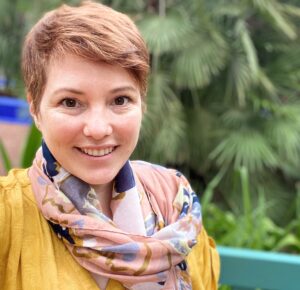Member Insight – Jennifer Dykxhoorn
 What sparked your decision to become an epidemiologist?
What sparked your decision to become an epidemiologist?
After my undergraduate degree, I worked in a local public health department as a health promoter. While I enjoyed interacting with members of the community, I found that there was never time between falls prevention seminars, active transportation meetings, and flu shot campaigns to consider the evidence. Particularly in small regions, I saw that public health practitioners often lacked access to the resources and time to implement evidence-based practice.
I decided to do my MSc in epidemiology to gain skills in understanding the science underlying public health. It wasn’t a huge leap from public health practice to epidemiology, and I quickly fell in love with psychiatric epidemiology. I have been enormously privileged to study and work alongside inspirational researchers in Canada, the UK, Sweden, and more. I am thrilled that I have found a career where I get to ask questions, read widely, and make beautiful charts and graphs. What could be better?
What do you see as the biggest obstacle facing epidemiologists in the next five years?
Epidemiologists will undoubtedly face interesting and challenging questions in the coming years. I expect that epidemiologists will need to grapple with the complex ways that climate change threatens human health and how global events exacerbate existing inequalities.
Do you have any pets?
I am the tertiary care giver to the sweetest dog, Carrot, as her parents travel often. I also have a flourishing jungle of plants in my London flat, which brings me joy.
Why did you join SER? What keeps you coming back?
I joined SER during my PhD, as I wanted a way of staying up-to-date on the latest methods and emerging research. I have enjoyed learning from SER members during the annual meetings, webinars, and the extensive online resources. More recently I have been part of the SER Membership Committee and International Sub-committee, which has been a great way to get to know other SER members better, establish new international connections, and to advocate for international representation and visibility throughout SER.
What advice do you give students who want to become epidemiologists?
The best thing about epidemiology is that it provides you with an incredibly useful toolkit which can be used to ask questions, explore associations, disentangle etiological pathways, and quantify relationships. These methods can be applied to countless questions and real-world problems, and there is the flexibility to adapt your research to explore emerging issues as the world continues to change.
Outside of epidemiology what do you enjoy doing?
My favorite thing to do is travel and explore new places. One of the wonderful perks of living in London is that it is a travel hub, which means I can hop on a plane and spend the weekend in a different country. I just returned from three weeks in Morocco, and immediately booked my next trip!
What is something that not many people know about you?
I love scuba diving. In a good year, I will spend at least a week or two underwater! Not only do I feel like an astronaut while underwater, exploring a completely different world, diving can be very meditative, as you need to be completely immersed in the moment and your main task is to breathe.
